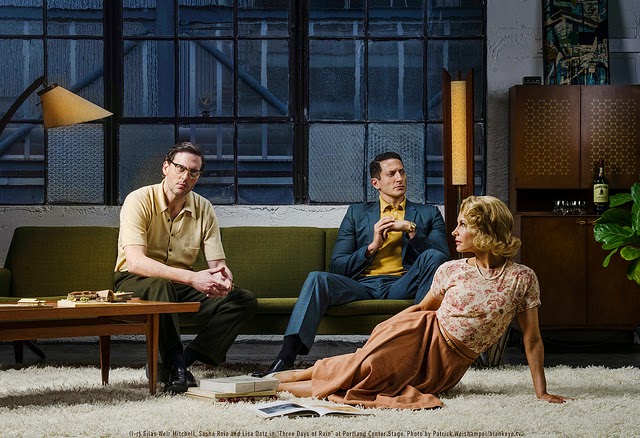From May 17 – June 21, 2015, at Portland Center Stage (PCS) the production of Richard Greenberg’s Pulitzer Prize-nominated play Three Days of Rain will be playing at the U.S. Bank Main Stage. The play stars 3 main cast members – two of which you may recognize from the TV show Grimm which is set and filmed in Portland – aka Silas Weir Mitchell (he plays Monroe in Grimm) and Sasha Roiz (he plays Captain Renard in Grimm) – as well as Lisa Datz (a veteran of Broadway and other TV shows herself). The story takes place in an apartment in Manhattan New York, with six characters, in two time periods.
It starts with the children in 1995 in Act 1. Then via that apartment as a connector, transitions after intermission in Act 2 to their parent’s time in 1960. During the two acts, the play explores the relationships of the 3 characters of each generation to each other, and also the differences and similarities between the generations of the parents and children. In many ways, Act 1 poses questions about the past from the children, and also implies questions about how the children we met in Act 1 became the people they are. Now Act 2 provides answers.
I was very lucky in that I was invited to watch the play on Opening Night.


Overall, my review of Three Days of Rain is that as an audience member, you are uniquely placed in the position of being able to see two sets of times, and seeing and hearing directly from each character. We hear two different interpretations of what the entry “Three days of rain” mean. Then it is left to us to exposit the rest of the journal entries, and the lives of the people on what happens next so that they lead to each other. It makes for great after the play dinner or drinks chat. And, the play invites you to do so – after all, there are times the characters are directly addressing us, the audience, as if asking for our input as third party.
In Three Days of Rain, there is some remarkable acting as we watch the actors so fully embody two different people that have such opposite emotional temperatures and stances on life. The costuming is spot on, from the typical 90s New Yorker leather coat and turtlenecks and slacks to smart tailoring and the use of that gold color in clothing in the 60s. The set and lighting is magnificent – Manhattan messy starkness almost like a squatter’s residence in the 90s, and then transformed in the 60s to warm sophisticated elegance befitting of a set of Mad Men. Even the background lighting implying the rest of the city shadows changes to match the vibe of the times.

The play begins Act 1 with Walker (Silas Weir Mitchell), a man searching desperately to connect with his father Ned. His father is a man Walker barely knows as he complains about his father being so silent. But he yearns to know him – we learn upon his father’s death, Walker then disappeared for a year without attending his father’s funeral and has only just returned from that disappearance. Walker has a lot of thoughts and emotions, and we see through the scenes how his sister Nan (Lisa Datz) and childhood friend Pip (Sasha Roiz) seem to revolve around Walker’s emotionally emphatic view of life.
It’s the type of character whose over-dramatic personality and impulsive behavior would seem irritating. But to Silas’ credit Walker comes off as someone who is seeking find his place as he literally wanders the world, but is so sensitive he feels too much. Even as he pronounces his judgmental statements, you still find him likable because it doesn’t seem he believes himself superior – he just finds life overall farcical. You can understand why Nan and Pip can both be frustrated but drawn by love to support and help him, despite his neurotic nature.
As Pip, Sasha plays a soap opera star and his 90s hair… well, the fact that Sasha can draw you in and make you look past the hair is testament to his strength of presence. Of the three characters in Act 1 Pip is the less weighty in thought, but he’s not shallow. It seems more like he’s just not the intellectual that Walker and Nan are – but he is earnest, and smart balanced with everyman sensibilities. His lightness may be because of, or perhaps is why, he seems the most happy with himself of the three and accepting of who he is and what life has handed him.

Portland Center Stage production of Three Days of Rain, ((l-r) Silas Weir Mitchell, Lisa Datz and Sasha Roiz in “Three Days of Rain” at Portland Center Stage. Photo by Patrick Weishampel/www.blankeye.tv.
In Act 2 we travel back to the 1960s, and we meet the more reticent Ned (Silas again) that Walker was trying to hard to understand. We find that Ned is the one who acts as a grounding foundation for the brighter lights he sees in his friend and architect partner Theo (who he calls genius), and the delicate and dramatic Southern belle Lina.
Silas is wonderful in really showing a range of character in the energy he exudes as Ned. It even is a bit of a shock to see how the same actor who was so boisterous and talkative before is now so calm and moderate, and how he can act through silence. This demonstration of incredible range is true of all three actors, as they must shift the emotional energy to embody the new parental character who is not yet a parent – being completely different yet also a hint of foreshadow for the children we just met.
Unlike the portrayal in Pip of a man who seems to be happy with his place in life even if it’s not too high, in this timeline Sasha plays Theo, a man who sees himself as a rising star trying to make a big mark on the world, and is struggling to manifest his talent. You can sense even from the various ways Sasha just stands the difference between this confident father and the humbler son, and both are magnetic.
The biggest dramatic change here lies in the characters played by Lisa, who goes from portraying the guardian big sister and voice of reason of Nan in the first act, to now the sassy, smart and passionate about life drawling and all aflutter Lisa. She is projecting what now we realize son Walker will inherit, as we the audience look for hints of the eventual mental breakdown she has which puts her out of the picture of the lives the children in Act 1.

Portland Center Stage production of Three Days of Rain, (l-r) Silas Weir Mitchell, Sasha Roiz and Lisa Datz in “Three Days of Rain” at Portland Center Stage. Photo by Patrick Weishampel/www.blankeye.tv.
We have the ability as the audience to see what parent and child were each individually like around the same age, and compare their personalities and what they are trying to do at that same point in time of their lives, 3 decades apart. We are privy to the hopes and dreams a father had, and know what kind of person he becomes and his son becomes. It makes you think about the hopes and dreams your parents may have had for you, spoken and unspoken – and wonder about the various ways of how you have and have not fulfilled them.
It may make you wonder about being able to get a chance to see what your parents were like at your age – how were some of those traits passed to you, or how are you not the same at all? What are the stories behind some of those old photos of your parents? You know your parents as your parents, but how well do you really know their motivations and choices?
There is no overt explanation of the how the two acts and the characters have affected each other through the two time periods. You may feel like we did that the second act even seems to end abruptly because it doesn’t try to conclude anything at its end It only presents the evidence for the audience during the course of the acts to gather, and leaves it up to interpretation. You might hate this, or take up the offer of debate with your fellow theater companion.
F and I debated based on what we find out the journal means to Ned, how Ned truly felt about Theo and Theo’s early death. We discussed whether Walker did realize Ned’s dream life – and whether that dream turned out all that Ned had thought it would be. How did the Ned and Lina and Theo we meet in the second act evolve into the Ned and Lina parent personalities, or impressions of parents, that we hear from Walker and Nan and Pip? And, since we had both also seen The Lion (my review here), PCS’s other current production also dealing with a son and the legacy of his father, we compared the two sons tormented by memories of their father and who was more sympathetic and why.
There isn’t a resource guide up yet as I write this post, but I always recommend looking through one if you happen to attend a play that has one available, it can be a great source for extra trivia or background context, and fodder for more discussion. Look for the resource guide on the Three Days of Rain home page.
May 17 – June 21, 2015 Performance Times and Prices (Wheelchair and youth/student tickets $25-30. Rush tickets are $20. See more details and other ticket specials for groups or military here):
- Evenings: 7:30 PM: Tues, Wed, Thurs, Sun ($44-68) and Friday ($54-74) or Saturday ($59-79)
- Matinees: 2 PM Saturday and Sundays ($46-62) or Noon on Thursdays ($41-57)
The run time of the play is about 2 hours 15 minutes with one intermission.
Three Days of Rain is recommended for ages 14+ as it contains mature language and sexuality. The actors in this production will be using tobacco-free herbal cigarettes. Children under 6 are not permitted at any PCS production.
If you plan to sip a beverage (with a lid on in the theater), I would recommend the Portland Center Stage cocktail themed for the Three Days of Rain, the Grey Skies, a cocktail with Crater Lake gin, earl grey simple, lemon and honey. Check out the other themed cocktails at as well (the last 3 listed at the bottom are for Three Days of Rain, the first three are for The Lion – though you can order any of the 6 of course!)


Disclosure: I was invited to see this production, but I will always provide my honest opinion and assessment of all products and experiences I may be given. The views and opinions expressed in this blog are entirely my own













Is it bad that I would consider seeing this mainly because it has two actors from Grimm in it? 🙂 But your review does intrigue me. I’d be curious to see how that abrupt second act ending plays out.
You might spot other Grimm cast too, supporting their friends: I know I saw Russell Hornsby smoothly walking around like a cool drink of water :X Also there was Mary McDonald-Lewis who played Frau Pech on Grimm and is the voice of OnStar
Such a great review! I was sad to miss this but your recap has me feeling I was there!
I wish I had been there longer – I heard later that Noah Wyle was also there opening night but I didn’t spot him! Perhaps it’s for the better, too much handsomeness to see Sasha and Noah and Silas all in one place, I might have swooned
Oooh, I really want to see this (mostly because I’m a Grimm fan), but I’m having trouble convincing my husband to go. Let’s just say, he’s not much of a theater person. Perhaps I should just get tickets and “surprise” him!
Just remember that he can have a beer (with a lid on) during the show, and there are several parts which are pretty funny as the characters go back and forth. And, the subject matter about understanding who your parents are is a universal one that could spark some interesting conversation about your own parents, and what your children will understand or know about you when they get to be your age.
I came for the food blogs, stayed for the play reviews. Nicely done.
Great review, and so nice seeing you there! I really enjoyed the play, loved hearing the kids’ perspective on things in the first act and then learning the truth in the second act, totally makes you question what you think you know about some people!